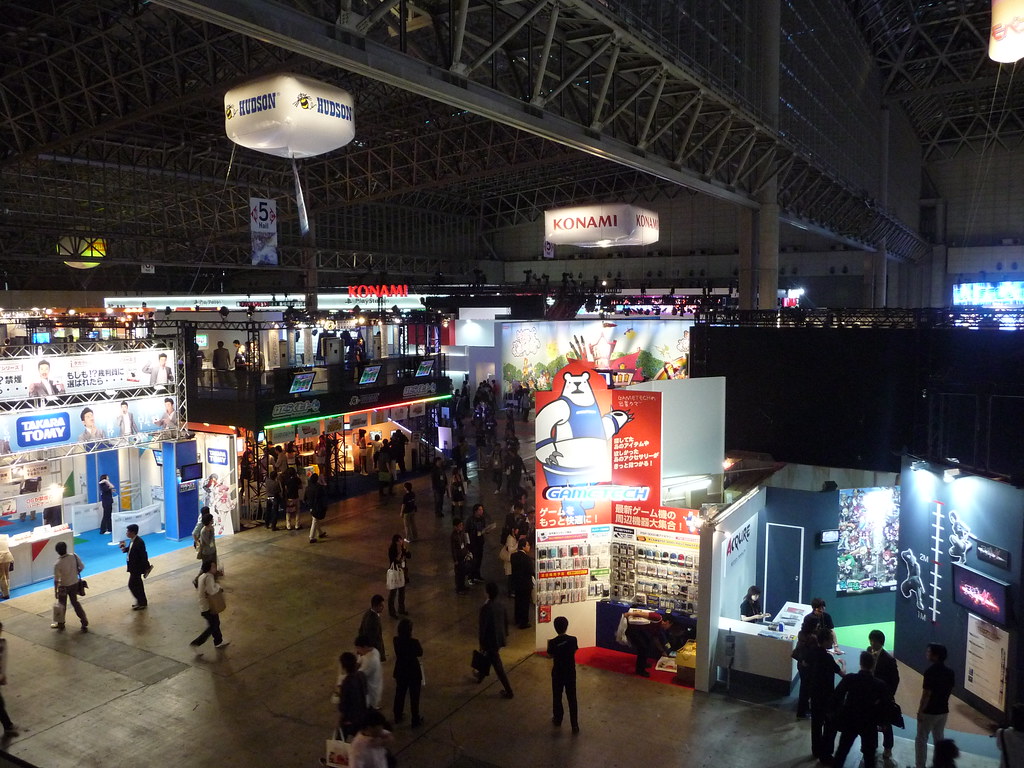 Last week I spent 3 days in Japan for the Tokyo Game Show, and for some meetings with online gaming companies and agencies. A short trip, but absolutely worth it. Especially the Tokyo Game Show and the things I heard during the meetings gave me a lot of inspiration for opportunities that still exist in Japan, but also ideas that can be used in other countries in Asia. Japan is so close to China, but it’s a whole different world.
Last week I spent 3 days in Japan for the Tokyo Game Show, and for some meetings with online gaming companies and agencies. A short trip, but absolutely worth it. Especially the Tokyo Game Show and the things I heard during the meetings gave me a lot of inspiration for opportunities that still exist in Japan, but also ideas that can be used in other countries in Asia. Japan is so close to China, but it’s a whole different world.
It already starts when you arrive at Narita where you have to take a train in order not to arrive bankrupt in Tokyo itself. Taxi’s are outrageously expensive and the airport is about 80 km from downtown Tokyo. Hotels are similarly priced, we stayed in a hotel close to Shinagawa harbour and paid something like USD 160 per night for a 8m2 room (I think it was arranged by the Dutch government, next time I’ll take a hotel closer to downtown). Prices are not as bad as during the 80’s I was told, but I was still shocked at having to pay USD 40 for a couple of beers in an average bar. Even taking the metro is an expensive affair, taking a taxi in Shanghai would be a lot cheaper for the same distance.
 What I like about Tokyo is that it’s a bit like a village. There are of course some skyscrapers (but not as tall as the ones in Shanghai), but generally there are a lot of 2-3 story houses all over the city. If you walk into a side street from one of the main streets you are immediately in a quiet environment totally unlike a metropolitan city. Also traffic is pretty good, there are not many cars around, even not during rush hour. Most people take the train, probably because it is cheaper and faster: traffic lights are horrible and it can take ages to get from A to B inside the city.
What I like about Tokyo is that it’s a bit like a village. There are of course some skyscrapers (but not as tall as the ones in Shanghai), but generally there are a lot of 2-3 story houses all over the city. If you walk into a side street from one of the main streets you are immediately in a quiet environment totally unlike a metropolitan city. Also traffic is pretty good, there are not many cars around, even not during rush hour. Most people take the train, probably because it is cheaper and faster: traffic lights are horrible and it can take ages to get from A to B inside the city.
The Tokyo Game Show itself was fun, and also very different from ChinaJoy (Shanghai’s Game Show, that is actually bigger than its Japanese counterpart). While in Shanghai you see lots MMO’s and other online games, they are almost completely absent at the TGS. What you see is mainly console game titles (consoles are machines like the Playstation, Wii or Xbox360) or titles for handhelds (like the Sony PSP or the Nintendo DS). Next to that a lot of mobile game titles, with most of them programmed in FlashLite. But hardly any pure online games like you see them in the rest of the world. We saw and met with some interesting mobile virtual worlds (think social network meets games on a mobile), very interesting to see what they have achieved so far in Japan. The rest of the world is still far behind in that respect. Not illogical, considering the fact that mobile internet speeds in Japan are higher than the fastest broadband in China. People seem to use their phones for everything, from playing games to watching TV to paying for their metro fee. Some even still use them to make phone calls!
We saw and met with some interesting mobile virtual worlds (think social network meets games on a mobile), very interesting to see what they have achieved so far in Japan. The rest of the world is still far behind in that respect. Not illogical, considering the fact that mobile internet speeds in Japan are higher than the fastest broadband in China. People seem to use their phones for everything, from playing games to watching TV to paying for their metro fee. Some even still use them to make phone calls!
It was a very inspirational trip for me and I am glad I took the time to go the Tokyo Game Show. Last year I decided not to go, but because we will launch our first site in Japan soon I am glad I went this time. Japan is a different country from most other Asian countries, but I believe that we can be successful there as well. Time will tell whether it will work out, but I am quite optimistic.
“Shanghai’s Game Show, that is actually bigger than its Japanese counterpart)”
Eh ?! Did you go to all 3 wings ?? TGS is so much bigger ! Not to mention, the quality of what’s on display is not REMOTELY comparable !
Sure I went to all three wings, it’s still smaller than ChinaJoy though. On the quality of what’s on display we also disagree: What’s missing in Tokyo are the online games and MMORPG’s, you mainly see new games for consoles and handhelds. Also not too many mobile games (except around DoCoMo), I was told they had a lot more of these in the last years. The show gave me some new ideas, but I probably won’t go back next year. Shanghai is definitively better for me.
I guess we do disagree, but let me give you a few figures first: TGS is where the world looks now, since E3 is virtually dead. It smashed all attendance records this year (194,288?). If you were going there hoping to see MMOs, no doubt you’d be disappointed. But the reality is that outside China, MMOs are (and probably will be for a while) a niche market. And since TGS is now somewhat of a global show, it’s only normal.
As for the quality, are you really gonna argue that chinese developers of MMOs for the local PC market are even remotely a match for the likes of Sony, Capcom, Konami, Nintendo ? You mention consoles and handhelds as if they’re on the downturn, when it’s actually the exact opposite, vs. PC, at least on the global market. Of course, you’re probably hoping to focus on the Chinese market, but there’s no denying that it is seriously lagging in technical, artistic, and gameplay quality, regardless of whether it’s profitable or not.
Finally, on the subject of mobile games, well, the official CESA figures was that 32% of what was on the showfloor was mobile games, That’s more than any other single platform. So, really, not sure what you didn’t see…? Did you check AU too ? It was gigantic. But perhaps unexciting indeed, because I believe the mobile market is topping up, and that falls in line with what you were told as well.
Anyways, my 2 cents… I guess it all depends what market you’re in. You’re in the casual portal market, so it’s true that that isn’t the focus of TGS.
I am looking at the worldwide market (I am in charge of Asia, incl. Japan, and not only China), and then I notice that TGS is missing the whole MMO and online casual game part. This surprised me, Shanghai not only has consoles (even though they are not officially allowed) but also MMO and casual games. That also means that there may be a business opportunity in Japan of course.
In terms of size I am still quite sure Shanghai is bigger, even though Tokyo may have a couple more visitors (ChinaJoy had about 185,000 visitors this year). I had expected a bigger event because TGS has the name to be big show. I guess my expectations were different, maybe because ChinaJoy has grown so much over the past years.
The gaming world is a lot bigger than the hardcore gaming market. There are a lot more people playing casual online games than console games, that you seem to regard as the only real games. That’s fine with me, but from a business perspective I cannot ignore the biggest and fastest growing part of the market.
I understand that from a business opportunity it makes sense, as it’s a faster growing market, and lower cost of entry, but as for it being a bigger market than hardcore… maybe in terms of heads, but in terms of selling and monetizing, I doubt it. Plus that market is already capping off in most developed countries, and probably soon in China as well, so what would be your next move then ?
MMOs in China don’t have a “cultural edge”. They’re just the best way they found to avoid piracy (to some degree). Now as soon as consoles become legal, which I believe should happen soon, and income levels are high enough, you know the Chinese are also waiting for their AAA global-standard game experiences on consoles (they’re playing them right now, just not paying for them). Right now, it’s very much a question of money, and not taste, that is guiding what sells in China.
As for ChinaJoy being bigger… how many of these people were actually there for the games, and not the cosplay, and other random stuff? You’re honestly the first person in the biz I hear say they were satisfied with ChinaJoy, I kid you not… 😉
Anyways! 😉 Just curious as to what your long-term vision is. I don’t see the hardcore market as the only one (after all, i’m still in the mobile market), but I see that the casual market is not as huge as the numbers show, when it comes to people actually buying games.
My long term vision is that casual games will be the biggest in the long run, and that especially mobile casual games will be the next frontier. I don’t think people will buy casual games (all our flash games are for free), monetization will have to come through ads and in-game items.
You mean for China or globally ? Because I just have to disagree with you on that… But we’ll see… 😉
Globally. I think casual games could now already be much bigger, but I don’t have the exact figures to prove it. But let me try: Spil Games has 100 million monthly unique players worldwide for its casual games, that’s a HUGE number. And it continues to grow very fast. Spil is not even the biggest player on the casual games market (yet). The total number of XBOX360, Wii and PS3 sold is ‘only’ about 55 million (www.nexgenwars.com). So which game segment do you think is bigger?
So you want to talk strictly about the number of users ? That’s a really deceiving, one-sided number!
Especially considering you’re not even including DS and PSP in there! Installed base of DS is upwards of 70 million worldwide, and PSP, maybe around 40 million ?
Let’s be honest and say instead that the point of entry is much lower for “casual” games, and basically, it’s impossible to get into consoles at this point, so there’s no other choice. But that doesn’t mean the risk isn’t there, as the market is getting flooded.
Casual gaming houses are not about to overtake the big players anytime soon. Sure, there’s a slice of the pie up for grabs, but to say that it would “overtake” console or “hardcore” gaming is a bit deceiving, unless you’re just talking about a number of players, which really, doesn’t translate directly into any fixed money figure right now.
If you’re going for the in-game ad model though, you could have a good estimate of how much money that much players brings you. But then it’s more a question a selling traffic to a portal than selling games, isn’t it ?
Plus, on my end, I believe as soon as consoles become legal in China (which should happen soon enough) and people’s disposable incomes go up, there’ll be a move away from small games and MMOs, and growth in the AAA console market, just like anywhere else in the world. In fact, people already have the consoles here, and they clearly want the games, it’s just a question of the legal aspect opening up, and creating a proper market. So I’m not too worried about the growth possibilities for consoles either…
Anyways, I’m gonna stop the argument here on my side ! 😉 Let’s check back in a year or so… 😉